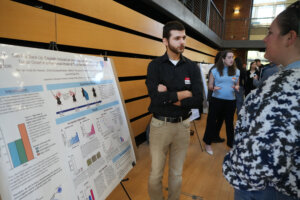
For University of Mary Washington junior Mohammad Ali Hassan, Saturday’s presentation was personal. Standing in front of a poster representing his work in the lab, the biology major spoke of his family’s experience with two different types of aggressive cancer.
Hassan’s research employs mice to test the effects of immunogenic chemotherapy on triple-negative breast cancer, a similarly illusive and fast-growing disease. “I was grateful for the opportunity to study something I’m interested in and develop my skills in a laboratory,” he said of his recent stint in UMW’s newly named Irene Piscopo Rodgers ’59 Summer Science Institute and the work he’s completed with fellow Mary Washington students.
Guided by Assistant Professor of Biological Sciences Laura Sipe, Hassan’s project was one of more than 80 displayed and discussed during the sixth annual Network for Undergraduate Research in Virginia (NURVa) Conference. Marking its début appearance at the University of Mary Washington, the event turned the Hurley Convergence Center into a repository of scholarly exploration, with posters on view in the downstairs Digital Auditorium and oral presentations taking place on the upper floors. More than 100 students came from schools – large and small, public and private – across the Commonwealth to share their work, including about a dozen from UMW.
“Mary Washington was thrilled to host the NURVa annual conference this year,” said Director of Undergraduate Research Elizabeth Lewis. “Not only do students get to showcase their hard work, they also have a chance to interact with peers from other institutions in the state. I was really proud of their great work and the hospitality of our faculty and students.”
NURVa Chair David A. Salomon of Christopher Newport University kicked off the opening message for the daylong event, with UMW Provost Timothy O’Donnell encouraging participants to take advantage of the opportunity to interact with fellow researchers from other institutions.
Hassan’s study – “Call for Back Up: Cisplatin Induced Immunogenic Cell Death to Delay Tumor Onset in a Preclinical Model of Triple-Negative Breast Cancer” – was among those exploring everything from physical exercise in older adults to coastal resilience in urban environments. Christopher Newport, George Mason, Liberty, Longwood, Old Dominion, Radford, Virginia State and Virginia Commonwealth universities participated, along with the College of William and Mary, Hampden-Sydney College and Virginia Tech.

Liberty University juniors Alyssa Canelo, Annaliese DeFelice and Victoria Pacheco explained their research on antibody production in zebrafish and the light it can shed on the environmental effects of microplastics. “This is important because there are plastics everywhere,” Canelo said. “It’s an unexplored area, so it’s really important that we were able to do this.”


Haley Gilley, a sophomore at Radford’s Davis College of Business and Economics, studied “gamification” of the learning experience, researching the propensity of course-based escape-room experiences to improve student motivation, even for those who don’t “win.”
Longwood junior biology major Jackson Geeslin’s study – “Impacts of Polyethylene on Batrachochytrium Dendrobatidis” – explored the effects of environmental pathogens on an aquatic fungus that adheres to amphibians. “We can’t just take all the fungus out of North America and send it back,” he said. “But we can help mitigate its effects.”



UMW junior Kassandra Williams explained her research – “Convolutional Networks for Determining Optimal Block Preconditioners” – with Assistant Professor of Computer Science Evan Coleman. Enlisting concepts like Block-Jacobi preconditioners, the Goldilocks problem and PNG regression analysis, she aimed to break enormous equations into understandable bits, through computational guesswork that gets closer and closer to an actual answer.
“If we get the model to a point where it feels successful, it could be nice to introduce it to engineers,” said Williams, who received the Ralph A. Niemann Scholarship in Computer Science. “I really enjoy applying classroom knowledge to real-world topics, and I’m excited to see other examples from other schools.”
To learn more about the Network for Undergraduate Research in Virginia visit the NURVa website, or explore UMW’s Research and Creativity Collaborative website for the latest news and for details on applying for funding.


